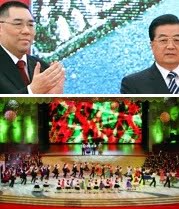On a visit to celebrate the 10th anniversary of the city’s transfer to China from Portugal, PRC President Hu Jintao praises “the constant progress made by Macau people of all circles in pursuing a development road that conforms to Macau’s realities.”
Interesting development road, interesting realities. Large-scale expansion of the casinos – the only legal gambling in China – has resulted in a flood of money from the mainland, much of it almost certainly the ill-gotten gains of corrupt local officials being frittered away or laundered. Beijing can adjust the flow, and always leaves the tap at least half on. Billions upon billions of dollars have gone into the pockets of a few local and Hong Kong families and big professional American interests who have licences to run ‘gaming’ establishments.
The Macau government’s slice provides nearly 80% of tax revenues. GDP has nearly tripled in the last 10 years, leaving the city’s people statistically Asia’s second-richest. However, after allowing for a sharp rise in living costs and an influx of overseas labour that has depressed wages, most of them have seen relatively little of the new wealth. Instead, a lot of money has been disappearing into a black hole.
The one, officially admitted Shocking Case of Administrative Corruption is that of Ao Man-long, now in prison for taking US$100 million in bribes from developers, construction companies and so on. No-one in Macau believes that Ao’s direct boss, outgoing chief executive Edmund Ho, knew nothing about it (there is a charming rumour that Beijing will settle accounts with him later). Nor does anyone believe that Ho’s successor, Fernando Chui Sai-on, appointed by Hu yesterday, is innocent of wrongdoing in the US$180 million overspend on the Macau Dome arena built for the 2005 East Asian Games, from which Ao received plentiful kickbacks. The government auditor who publicized Chui’s involvement is the one official not reappointed to the new administration.
Needless to say, none of this appears in the China Daily coverage of the 10th anniversary of Macau’s handover, in which everything seems to be perfect (though the president looked thoroughly bored yesterday as Chui formally introduced his cabinet to him one by one; it was clear he was totally uninterested – or wanted to appear totally uninterested – in who the various public works, transport, security and other secretaries were).
 It is impossible not to ask one simple question: Why does Beijing choose one widely-presumed-to-be-tainted man after another to be in charge of the place?
It is impossible not to ask one simple question: Why does Beijing choose one widely-presumed-to-be-tainted man after another to be in charge of the place?
For a big clue, let’s look at another fact not reported in the official press (or anywhere else I know of). Every usher, technician, musician, dancer and guest present in the Dome for Saturday’s celebratory gala had to complete a Chinese Ministry of Public Security questionnaire asking for details not only about themselves, but their parents and – yes! – grandparents (residence, jobs, etc). Macau’s predictable refusal to admit Hong Kong activists and journalists over the weekend was part of a bigger bout of paranoia.
Like any authoritarian regime, China’s leadership fears and distrusts just about everyone else in (let alone outside) its own country. There are good, clean people in Macau, but they don’t get a look in – or, like the conscientious auditor, are discarded. Although unwilling to endorse corruption openly, Beijing seems to feel comfortable only with local administrators who materially and massively benefit from the city’s economy. The notion that someone might look after the cookie jar out of duty, pride or virtue and not dip their hands into it unnerves them. It is as if such people are a threat.
We see something similar in Hong Kong, where public funds flow to Beijing’s favourites via pointless infrastructure projects. It is not simply an unwillingness to kowtow or shoeshine that leads Beijing to view moderate, constructive and thoughtful people active in civic society as untouchable outcasts. It is the fact that they are not complicit.

